Millie Boynton
Hannan’s Eventful Life
Millie wiped her hands
on her apron. She would have wiped her
eyes, but she could not cry, nor shed a
single tear. She’d often cried at night,
but no one would ever see her cry.
She looked back over her
life. So much had happened in her
lifespan of thirty-three years. She
remembered her wedding day when she was
nineteen. Her mother had passed away in
June of that year, never knowing that
her youngest daughter was “in a family
way.” Mother had suffered a long time
with terrible pain due to stomach
cancer.
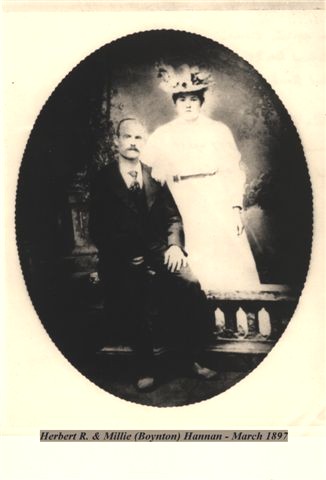
On Christmas eve in
1898, Mille had married Herbert Hannan,
six and a half years older than she. He
was a handsome young farmer whose father
and grandfather had served in the Civil
War. Herbert’s own mother,
Melinda, had died at age forty when
Herbert was but twelve years old. How
Millie missed having her mother to talk
with. Herbert had swept her off her feet
with his charming ways and flashing wry
smile. Just a twinkle in those sparkling
blue eyes of his would melt Millie‘s
heart.
Herbert was a hard
worker and provided well for her and
their growing family. But as more
children arrived, it seemed harder to
keep up with feeding and clothing the
brood. Mildred was born in 1899,
followed by Gladys in 1900. Then came
Herbert Jr., Roy, Bertha, Daisy, David,
Trafton, Waldo and Lester, all within
eleven short years.
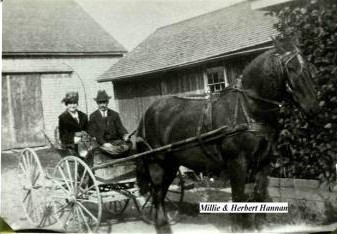
Papa was a great help,
asking Herbert and Millie to move in
with him in his large farmhouse in the
Kingdom. Herbert and his brother, Dell
and sister, Cad had gone to the other
side of Montville on the Plains Road in
November 1903 and brought Hebert's
father, Civil War veteran and widower
Martin Hannan on a sleigh called a pung,
home to the Boynton farm to live with
them. Martin died in April 1904, age
sixty-four years of age.
Herbert worked out for
local farmers, as well as coopering at
home on the farm. His barrels were of
fine quality, which he hauled to
Rockland, through Searsmont, down over
Moody Mountain to the Bog Road, through
Camden with his horse pulling the old
hay wagon loaded with barrels, which
were termed ‘lime casks.’
He sometimes took young
Herbert and Roy with him. Even though
they were young, they were a great help
around the farm and in the cooper shop,
so much so that he often forgot Herbert
was only nine years old.
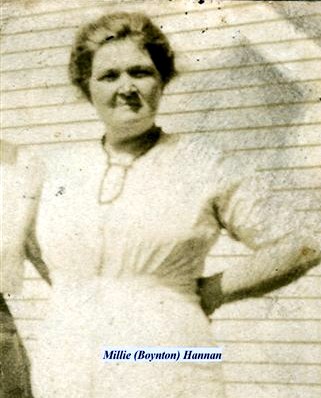 One
winter night in 1909 Herbert’s cow died.
The local newspaper under the South
Montville town column wrote: “Herbert
Hannan recently lost his only cow and as
he is a poor man, with quite a large
family, his kind neighbor Mr. Baker, has
started a subscription to get another
cow for him. We hope all who have the
opportunity and can help, will put their
hand down into their pocket. A friend in
need is a friend indeed.”
One
winter night in 1909 Herbert’s cow died.
The local newspaper under the South
Montville town column wrote: “Herbert
Hannan recently lost his only cow and as
he is a poor man, with quite a large
family, his kind neighbor Mr. Baker, has
started a subscription to get another
cow for him. We hope all who have the
opportunity and can help, will put their
hand down into their pocket. A friend in
need is a friend indeed.”
Millie worked hard
raising her children, breast-feeding as
long as she could, preparing meals,
canning, making butter and cheese,
salting down greens and salt pork,
washing their clothes on a scrub board,
drawing water from the well for cooking
and washing.
She made clothing for
her children whenever she could get
material. Her father-in-law, Martin gave
Millie his blue woolen Civil War coat
with brass military buttons on it.
Millie made a coat for Mildred from it.
Mildred wore the coat, Gladys wore it,
then Herbert. It was then given to a
poor neighbor boy to wear out. It was
hard to believe there were any poorer
children than Millie’s in the
neighborhood.
On another cold night in
January 1911, one of the family smelled
smoke. The fire in the stove had been
wooded to ward off the chill that crept
into the old farmhouse. A fire was
discovered in the living room, which had
started around the funnel of the
stovepipe which went into the chimney.
Embers had dropped onto clothing drying
on a rack behind the stove. Some of the
clothing and bedding burned, but the
family thought itself very blessed to
still have a roof on the house.
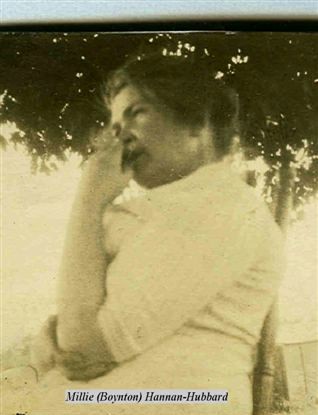
Millie remembered the
day Herbert came in from the cooper
shop, saying he couldn’t see well, and
that he had a blinding headache. He went
to bed, asking young Herbert to come sit
with him. He told the boy to take care
of his mother and to watch over the
younger siblings. The headache grew
worse. There was no money to call for
the doctor, but Papa sent young Herbert
to Liberty to fetch Dr. Albert D.
Ramsay. Herbert had passed away by the
time that the doctor arrived. He was
only thirty-eight years old.
The Centre Montville
town correspondent wrote: “Mr. Herbert
Hannan died Wednesday, the eighth, after
suffering from an abscess in the head
which broke and discharged on the brain.
He leaves a wife and ten small children,
who were dependent on his earnings for
their support. The oldest is eleven, and
the youngest a month old. He was an
industrious man and has always been able
to care for his family ...”
It all had happened so
suddenly. Millie had thought that she
and Herbert would grow old together, and
now he was gone. It was all like a bad
dream. Nothing made any sense. She
couldn’t even think about what tomorrow
would bring. She couldn’t organize her
thoughts. She had ten children now
dependent on her, including a one
month-old baby who needed feeding.
Mildred and Gladys tended to the young
ones and put a meager meal on the table.
In a few days, friends
and neighbors brought in firewood,
vegetables and food from their larders.
Herbert had raised a good garden the
year before and had raised a pig. She
had a partial barrel of salt pork in the
cellar, potatoes, salted greens and
perhaps one hundred jars of her home
canning left, but how long would it
last?
At least she still had
her eighty-one year old father to lean
on. Mr. Baker was coming by with his
gasoline engine to saw up the wood.
Millie had no hay to speak of in the
barn, so the next week she sold her
horse to a neighbor. After all, what
good was a horse if you had no feed and
no place to go. With the immediate help
of the neighbors, it seemed that good
will was soon forgotten.
Millie was not eating
well herself. She did not want to take
food from her family. Baby Lester fussed
more and more. He was so tiny, and did
not seem to be growing. She just did not
have enough milk to feed him. In May, at
three months of age, Lester died, just
two months after his father. They buried
the tiny babe beside his father in the
Pine Grove Cemetery in Searsmont.
She struggled on,
thankful for the help of her older
children, even though they were very
young. So much was expected of them. She
was also thankful her family was all
together. Gladys had not been feeling
well. Dr. Ramsay diagnosed her with
rheumatic fever, which caused her to be
blind. As if those problems were not
enough, Papa Boynton, Millie’s father,
contacted pneumonia and died January
12th. He was eighty-two years of age.
His death left Millie feeling completely
drained and alone. She had been doing
some housework, cooking and cleaning for
some of the more affluent farmers’ wives
to bring in food for her children.
It was sometime after
Herbert’s death, and probably after
Lester’s death, Millie couldn’t seem to
remember when because life had all
become a blur in her memory, that the
town selectmen held a meeting. Shortly
after, they came to Millie’s door to
tell her that because of her
circumstances of being a young widow
with all of those children, they had
come to take some of her children away
“to a better life.”
Bertha, age five and a
half, and Daisy, age four years, were
taken away from the only loving family
that they’d ever known to the Girls’
Home, the county orphanage in Belfast.
Roy, who was seven and a
half, was taken to a local farm to work.
Millie was once again in shock. She had
no say in where her children were taken,
nor did she even have a chance to hug
them or to say, “I love you,” or
anything. This was something Daisy
remembered the rest of her life. The
other children were also devastated by
the break-up of the family. They did not
meet again until they were grown.
Millie stopped thinking
about her past year, and again wiped her
hands on her apron. So much had
happened. Here it was, nearly a year and
a half after Herbert’s death. She stood
alone in the kitchen, twisting the apron
in her hands. What was she to do now?
She was thirty-three years old, and once
again “in a family way.” This should
never have happened. The charitable
neighbors had not all been honorable.
She had no one to talk to, no one would
believe the word of a young widow about
a “pillar” of the community.
One fifty year old
neighbor, Joe Chapman had been asking
her to marry him. She didn’t really like
the man, but it seemed as though it was
the only solution to her problems. So,
November 12th, one year and eight months
after Herbert’s death, she and Joe were
married.
The Liberty newspaper
correspondent wrote, “Joe Chapman and
Mrs. Millie Hannan were married last
Saturday night, L. D. Jones, Esq. tying
the knot.” It all seemed very flippant.
Millie often thought about what the
neighbors thought about her. They should
have walked in her shoes, such as they
were, for awhile.
Joe was abusive from the
night of their marriage. He looked down
upon her, accusing her of many things,
and often hit her. Millie thought life
couldn’t get any worse. Three months
after their marriage, George was born.
Joe left, and good riddance. Millie
clung to her baby, George, who went by
the name of Hannan all the days of his
life.
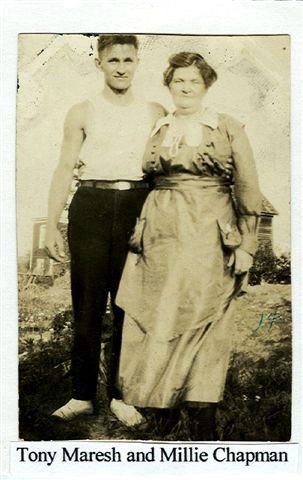 Millie
was told that Roy would be taken to a
farm where he was to be clothed and well
taken care of. A few years later, one of
his sisters saw him driving a horse on
the road. He was thin, dirty, dressed in
rags and covered with lice. He said
often he did not have enough to eat. He
was allowed to come home for a time.
Millie
was told that Roy would be taken to a
farm where he was to be clothed and well
taken care of. A few years later, one of
his sisters saw him driving a horse on
the road. He was thin, dirty, dressed in
rags and covered with lice. He said
often he did not have enough to eat. He
was allowed to come home for a time.
Putting meals on the
table three times a day was often a
challenge. The only bread the family ate
were biscuits made from dough made from
flour, baking powder and milk, when
available. This was usually rolled out
and each biscuit dipped in salt pork fat
or melted lard, heating on the
woodstove. When Millie was rushed, she
mixed the dough a little softer and
dropped by spoonfuls on the baking
sheet, with a dab of hot melted pork fat
on them before baking. These she called
“slut biscuits”.
Life improved a little
for Millie as the family grew older.
Mildred married at age seventeen to John
Edgar Perkins, having three children
before Edgar left her to raise the
children alone. Gladys married at age
nineteen to a hard-working immigrant
from Russia, Anthony Maresh. Herbert had
been working out since he was very
young, helping his mother as much as he
could. In 1924, Mildred, her children,
Gladys and Tony had gone to
Massachusetts to find work there.
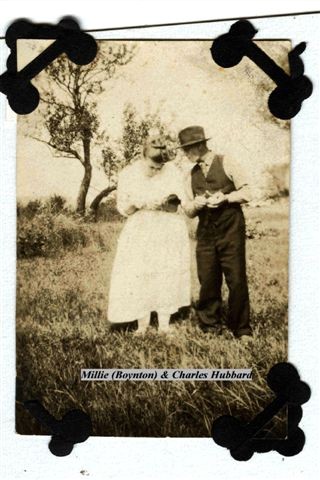 That same year, Millie
married Charles S. Hubbard, aged
fifty-three, in Belfast. Charles and
Millie took her younger sons and went to
Massachusetts, also.
That same year, Millie
married Charles S. Hubbard, aged
fifty-three, in Belfast. Charles and
Millie took her younger sons and went to
Massachusetts, also.
While in
Massachusetts, she came down with scarlet
fever. Millie died at the Boston City
Hospital, age 50 years, 11 months and 15
days. Millie had lived through some hard
times in her short life. How different
life would have been, had she and Herbert
lived to a ripe old age

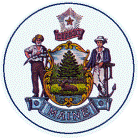



 One
winter night in 1909 Herbert’s cow died.
The local newspaper under the South
Montville town column wrote: “Herbert
Hannan recently lost his only cow and as
he is a poor man, with quite a large
family, his kind neighbor Mr. Baker, has
started a subscription to get another
cow for him. We hope all who have the
opportunity and can help, will put their
hand down into their pocket. A friend in
need is a friend indeed.”
One
winter night in 1909 Herbert’s cow died.
The local newspaper under the South
Montville town column wrote: “Herbert
Hannan recently lost his only cow and as
he is a poor man, with quite a large
family, his kind neighbor Mr. Baker, has
started a subscription to get another
cow for him. We hope all who have the
opportunity and can help, will put their
hand down into their pocket. A friend in
need is a friend indeed.” 
 Millie
was told that Roy would be taken to a
farm where he was to be clothed and well
taken care of. A few years later, one of
his sisters saw him driving a horse on
the road. He was thin, dirty, dressed in
rags and covered with lice. He said
often he did not have enough to eat. He
was allowed to come home for a time.
Millie
was told that Roy would be taken to a
farm where he was to be clothed and well
taken care of. A few years later, one of
his sisters saw him driving a horse on
the road. He was thin, dirty, dressed in
rags and covered with lice. He said
often he did not have enough to eat. He
was allowed to come home for a time.
 That same year, Millie
married Charles S. Hubbard, aged
fifty-three, in Belfast. Charles and
Millie took her younger sons and went to
Massachusetts, also.
That same year, Millie
married Charles S. Hubbard, aged
fifty-three, in Belfast. Charles and
Millie took her younger sons and went to
Massachusetts, also.